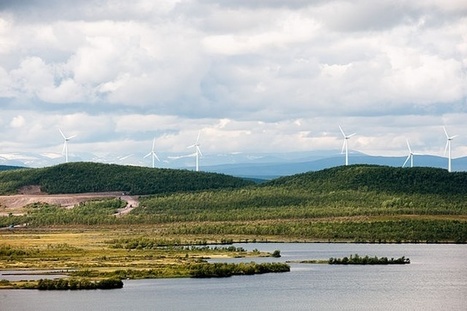 Your new post is loading...

|
Scooped by
Energy Cities
July 6, 2017 11:46 AM
|
1. Strengthening and reorientation of investment strategies Investment needs for sustainable infrastructure over the next two decades represent a once-in-a-lifetime transition. Rapidly scaling up low-carbon and climate-resilient infrastructure is key to sustainable development and inclusive economic growth and to meeting the climate …

|
Scooped by
Energy Cities
July 6, 2017 11:42 AM
|
The G20 under the German presidency will meet on 7 and 8 July in Hamburg. In a context of tension, particularly following the announcement of the US withdrawal from the Paris Climate Agreement, it is critically important that the Heads of State and Government – at least of the G19 and certainly no less – …

|
Scooped by
Energy Cities
July 6, 2017 11:38 AM
|
Lancée ce mardi 27 juin 2017, la plateforme Végétalisons Paris fédère tous les acteurs parisiens pour développer de nouveaux espaces de nature e

|
Scooped by
Energy Cities
July 6, 2017 11:20 AM
|
The European Commission's 'Clean Energy for All Europeans' package was the main theme of the meeting of the European Energy Council, whch took place on 26 June 2017, bringing together EU energy ministers, European Commission Vice-President Maroš Šefčovič, and European Commissioner for Energy and Climate Action Miguel Arias Cañete. Main results The Council adopted, without debate, a regulation on

|
Scooped by
Energy Cities
July 6, 2017 11:14 AM
|
Michael Bloomberg, founder of Bloomberg Philanthropies, has announced a new suite of investments over the next three years totalling US$200 million.

|
Scooped by
Energy Cities
July 4, 2017 12:21 PM
|
The notion of cities switching completely to solar, wind, hydro and other renewable energy sources has long seemed fanciful. But a new internationa

|
Scooped by
Energy Cities
July 4, 2017 12:10 PM
|
A policy roundtable, organised by the PUBLENEF project through one of the consortium organisations (Energy Cities) and the Energy Advice Exchange, was held on June 20th in Brussels during the EU Sustainable Energy Week in order to further explore the key role and importance of local authorities and energy advisory services in Europe’s energy efficiency…

|
Scooped by
Energy Cities
July 4, 2017 10:20 AM
|
The EU's 28 energy ministers on Monday (26 June) agreed on a general approach to the revisions of two key energy efficiency directives. But the European Commission lamented a “significant reduction” in ambition compared with its original proposals.

|
Scooped by
Energy Cities
July 4, 2017 9:50 AM
|
The Commission's Energy Union chief on Tuesday (27 June) urged all cities to join the Global Covenant of Mayors for Climate and Energy, an initiative which has gained more weight since Donald Trump announced the US withdrawal from the Paris Agreement on climate change.

|
Scooped by
Energy Cities
June 29, 2017 9:06 AM
|
Introduction Recent French and German incentives schemes to engage citizen in the roll-out of renewables demonstrate two things. Firstly, there is a real move towards greater financial involvement of citizen. Secondly, there is no common approach across EU Member States. French r/evolution Beginning this year France put a novel incentive scheme in place. Renewable producer … Continue reading Incentive schemes for citizen: Will the French energy r/evolution inspire the rest of Europe?

|
Scooped by
Energy Cities
June 29, 2017 5:54 AM
|
This report investigates the extent to which Crowdfunding for Energy Efficiency (CF4EE) could play a relevant role in scaling up investments in energy efficiency in developing countries. The document identifies conditions which are conducive for CF4EE and recommends policies and institutional actions that can help scale up CF4EE, where the conditions are favourable, in particular for debt and equity crowdfunding.

|
Scooped by
Energy Cities
June 29, 2017 4:25 AM
|
NEW IDEAS FOR POST-2020 COHESION POLICY: STRUCTURAL TRANSFORMATION AND INCLUSIVE GROWTH

|
Scooped by
Energy Cities
June 29, 2017 3:40 AM
|
The European Commission is currently conducting a mid-term evaluation of Horizon 2020, which will serve as starting point for reflections for the new EU R&I programme beyond 2020.
|

|
Scooped by
Energy Cities
July 6, 2017 11:43 AM
|
Atelier sur invitation – de 10h à 17h Les discussions se tiendront en anglais En Europe comme partout dans le monde, la réalisation des objectifs de développement d

|
Scooped by
Energy Cities
July 6, 2017 11:39 AM
|
Toujours dans la continuité de sa politique RSE et pour répondre au défi du changement climatique, la RATP vient de lancer sa première émission d

|
Scooped by
Energy Cities
July 6, 2017 11:21 AM
|
The Buildings Performance Institute Europe (BPIE) put the finishing touches on its comprehensive work on smart buildings, providing a working definition of a ‘smart building’ and making detailed policy recommendations to encourage their growth. The current negotiations on the Clean Energy for All Europeans package are a final opportunity to shape the European building stock of 2030. This latest intervention comes at a crucial point in support of those pushing for more ambitious policy and a genuinely smart European building stock of the 2030s.

|
Scooped by
Energy Cities
July 6, 2017 11:18 AM
|
Renewable energy sources like wind and solar are set to be the cheapest form of power generation in the G20 countries by 2030, according to a new study. The EU also announced that the Paris Agreement “cannot be renegotiated”.

|
Scooped by
Energy Cities
July 6, 2017 11:11 AM
|
We may now be entering a period of significant change in the Union, although this is still unclear. It is said that no good crisis should go to waste and if change is in the air and if Brexit could bring an unexpected belief and vision boost to the Union, then everyone with the capacity or the duty to do so, should put the needs of the citizen to the forefront as that change is managed.
People want control, they want agency. They want to be treated as they are entitled to be treated, as the primary focus of the work of the state and of its administration. They want to be treated as citizens - not customers.

|
Scooped by
Energy Cities
July 4, 2017 12:19 PM
|
Mission 2020 aims to bring a new sense of urgency to the global climate conversation, arguing that global emissions must begin to rapidly decline befor

|
Scooped by
Energy Cities
July 4, 2017 10:35 AM
|
Avoiding dangerous levels of climate change is still just about possible, but will require unprecedented effort and coordination from governments, businesses, citizens and scientists in the next three years, a group of prominent experts has warned.

|
Scooped by
Energy Cities
July 4, 2017 9:59 AM
|
The construction sector, responsible for 30 per cent of global emissions and energy use, has the tools it needs to cut carbon. But the lack of data an

|
Scooped by
Energy Cities
July 4, 2017 9:47 AM
|
Le Conseil économique et social français (CESE) et son équivalent européen veulent relancer la coopération des sociétés civiles européennes. Objectif: intégrer les questions environnementales et sociales à l'agenda européen.

|
Scooped by
Energy Cities
June 29, 2017 8:34 AM
|
The buildings sector is a key target in the European Commission’s policy for circular economy; a regenerative economic system in which resource and energy consumption are minimised. As a tool of the circular economy, Level(s) builds upon existing standards to provide a common EU approach to the environmental performance assessment of buildings.

|
Scooped by
Energy Cities
June 29, 2017 5:47 AM
|
Selecting the good practices was a challenge after the huge response to URBACT’s call. Almost three hundred cities responded, from every corner of Europe. In the end, the approved good practices come from 25 Member States. There are cities of all sizes, most of them smaller and medium sized cities with up to 250,000 inhabitants – where most Europeans live.

|
Scooped by
Energy Cities
June 29, 2017 3:47 AM
|
The present report describes and evaluates scenarios fostering the full integration of the Baltic electricity system within the EU power and market framework. Towards this goal, the de-synchronisation of the Baltic electricity grids from the Russia/Belarus system crucially represents a key-necessary requirement. In this sense, three de-synchronisation scenarios are assessed, looking in particular at alternative conditions of the Baltic power grid in terms of: (i) no synchronisation with any of neighbouring systems, (ii) synchronisation with the Nordic system, and (iii) synchronisation with the Continental European Network (CEN).
|

 Your new post is loading...
Your new post is loading...





























